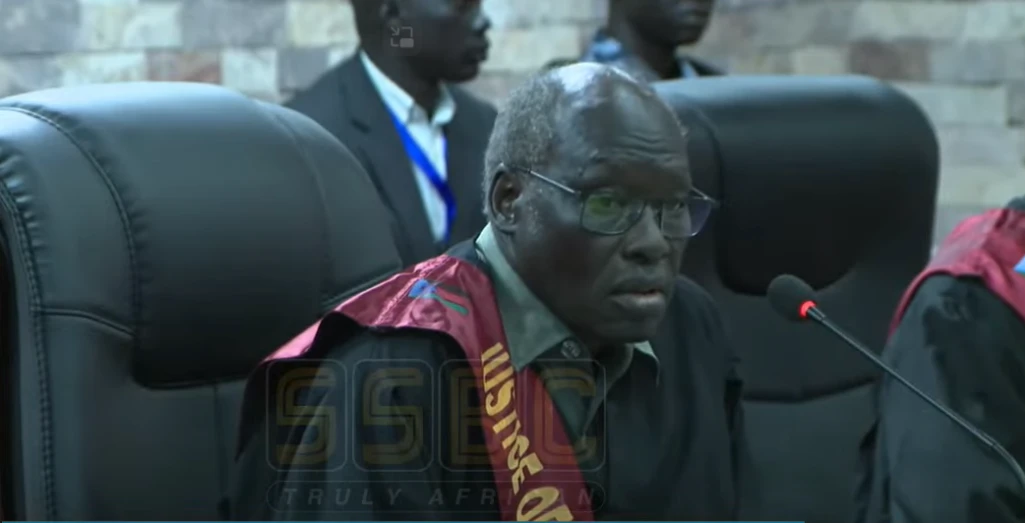A special court in South Sudan adjourned until next week a high-profile treason trial involving eight defendants, including opposition leader and First Vice President Dr. Riek Machar, after a session on Wednesday morning was dominated by a prosecution challenge to the licensing of two defence lawyers.
The adjournment marks the third delay for a case that has drawn intense scrutiny. The defendants face a range of serious charges, including murder, treason, conspiracy, financing terrorist acts, and crimes against humanity, stemming from deadly clashes in the town of Nasir earlier this year.
The three-judge panel, presided over by Judge James Alala Deng, postponed the proceedings until 9:30 a.m. local time on Monday, Sept. 29, 2025, at the Freedom Hall venue.
Judge Deng said the court needed time to consider written submissions from both sides on the licensing issue, as well as a separate, fundamental defence challenge to the court’s jurisdiction that was raised on Tuesday.
“It was the view of this court to conduct these trials on a daily basis. But we realise that this is not giving time or chance to the parties to prepare properly for the next session,” Deng said from the bench. He added that the court needed to review lengthy written arguments and that the break would allow the government to ease major security disruptions affecting nearby institutions like the university and local businesses.
Legal battle over defence team composition
Wednesday’s session was consumed by a procedural dispute after the prosecution team, represented by Dr. Sabri Wani Ladu, formally objected to the presence of two defence attorneys — Advocates Warnyang Kiir Warnyang and Deng John Deng — arguing they were not properly licensed to practise.
Dr. Wani cited the country’s Advocate Act of 2013, specifically Article 26, subsection 1, which states that an advocate must renew their licence by the end of January each year and that a failure to do so results in a suspension until it is renewed.
“The prosecution requests that those advocates be sent out of the defence team,” Wani told the court. “It is unfair to allow advocates who are not licensed to present the case.” The prosecution submitted a list from the Bar Council purportedly showing the two lawyers were not among those currently enrolled.
In a vigorous verbal rebuttal, defence lawyer Kur Lual Kur argued that the right to a legal defence of one’s choosing is a cornerstone of justice, protected by South Sudan’s constitution and international law. He contended that barring the two lawyers over an administrative formality constituted an “arbitrary practice of power.”
“The accused chose Advocates Warnyang Kiir and Deng John as their defence lawyers because of their competence,” Kur said. He alleged that although the lawyers had met the conditions for renewal, the Bar Association had blocked them “without legal justification.”
Kur invoked multiple legal instruments, including Article 184 of the 2008 Criminal Procedure Act, which upholds the right of an accused to be represented by counsel of their choice, and Article 14 of the International Covenant on Civil and Political Rights.
“The exclusion of two defence lawyers based on the absence of so-called ‘renewed silence’ is not only procedurally questionable — it undermines the defendant’s right to a fair trial,” Kur said. He submitted to the judges a copy of signed authorisations from all eight defendants confirming their wish to be represented by the two lawyers in question.
The prosecution remained unmoved, with Dr. Wani insisting that the regulation of advocates is a matter of law, not the court’s discretion. “Maybe those lawyers are not able to meet the requirement to get a new licence. So the objection mentioned by the defence is irrelevant,” he countered, adding that the state could provide legal aid to anyone without a lawyer, but could not permit an unlicensed one to practise.
Challenge to court’s authority
The licensing dispute follows a more profound challenge launched by the defence on Tuesday. Machar’s lead lawyer, Dr. Geri Raimondo Legge — a former Court of Appeal justice and current law professor — formally objected to the special court’s jurisdiction.
“Jurisdiction, my lord, is the power of the court to hear and determine the subject matter in controversy between the parties,” Raimondo told the three-judge panel. “The special court must have jurisdiction before it can proceed to exercise its authority in this case.”
Raimondo argued that the Nasir incident, which the government alleges involved Machar’s Sudan People’s Liberation Movement/Army-in-Opposition (SPLM/A-IO) and an attack by the White Army militia that killed an army general and dozens of soldiers, should be considered a ceasefire violation.
As such, he contended, it falls under the purview of the Ceasefire and Transitional Security Arrangements Monitoring and Verification Mechanism (CTSAMVM), a body established by the nation’s 2018 revitalised peace agreement, rather than a special criminal court.
The defendants and charges
The eight defendants present in court on Wednesday were identified as Puot Kang Chuol, 40; Mam Pal Dhuor, 37; Gatwech Lam Puoch, 66; Lt. Gen. Gabriel Duop Lam, 53; Dr. Riek Machar Teny, 73; Camilo Gatmai Kel, 47; Mading Yak Riek, 45; and Dominic Gatgok Riek, 27.
The court has yet to rule on either the jurisdictional challenge or the dispute over the defence lawyers. Judge Deng said the Monday session would address both objections, setting the stage for critical decisions that will determine whether the trial on the substantive charges can proceed.




